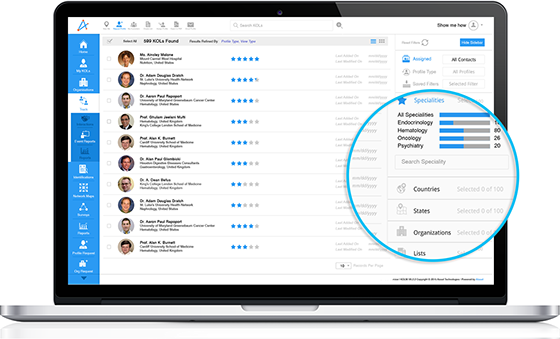11-03-2024
CNS Disease: Insights on Neuro Experts for Collaborative Excellence

Life sciences companies often collaborate with CNS experts for conducting clinical studies, spearheading research initiatives, and devising cutting-edge technologies for advancing diagnostic and treatment approaches in CNS disease space. For accurate identification and engagement of relevant experts, the importance of data insights cannot be emphasized enough.
This blog explores the realm of CNS diseases and highlights how teams can harness data insights to identify healthcare professionals in the neuroscience field for driving forward the collective effort to combat CNS diseases and improve outcomes for patients worldwide.
In this article:
What is CNS disease?
CNS (Central nervous system) diseases constitute a wide range of conditions that affect the functionality of the brain or spinal cord. It leads to reduced motor skills, sensory perception, or cognitive abilities. The central nervous system coordinates and controls the body's functions. Diagnosing and treating these diseases require specialized medical attention and may involve a multidisciplinary approach.
Among these are neurodegenerative diseases, such as Alzheimer's and Parkinson's, which involve the progressive degeneration of nerve cells and lead to impairments in cognitive and motor functions. It also includes autoimmune disorders like multiple sclerosis and myasthenia gravis and infections of the CNS, such as meningitis and encephalitis. These neuromuscular disorders encompass various conditions impacting the peripheral nervous system.
Vascular disorders like stroke and cerebral aneurysms, traumatic injuries like spinal cord injury and traumatic brain injury, genetic and metabolic disorders like Tay-Sachs disease and Wilson's disease, and functional disorders like epilepsy and migraines are some disorders of the central nervous system that significantly impact the quality of life.
The need for collaborating with CNS experts for life sciences
Many central nervous system diseases do not currently have a cure, but treatments are available to manage symptoms, slow progression, and improve quality of life. Advancements in genomic profiling, brain imaging, disease biomarkers, and mapping neural circuits have provided fresh insights into the complexities of healthy and diseased brain function. This has paved the way for exploring new CNS drugs and therapeutic approaches.
Life Sciences Companies seeking to advance research and development efforts in central nervous system disorders engage neuro experts. This collaboration could be for Clinical Trials, studies, or projects related to the central nervous system. These experts offer invaluable insights and guidance throughout the research process, from study design and protocol development to data interpretation and regulatory compliance.
Their specialized knowledge helps ensure that trials are conducted effectively, with appropriate endpoints and patient populations identified. Additionally, these neuro experts contribute to interpreting results and help translate findings into meaningful clinical implications. Their deep understanding of the intricacies of conditions provides invaluable insights that can steer research and development efforts in the right direction.
Generating Insights and Driving Engagement for Successful Collaboration
Identifying the appropriate experts who align with specific criteria is crucial for life sciences companies. To streamline this process, companies can leverage konectar. This AI-powered HCP Management Platform uses advanced algorithms and databases to find neuro experts based on specific criteria such as expertise, research focus, publication history, and clinical experience.
This allows life sciences companies to access comprehensive profiles of specialists and quickly identify individuals who possess the knowledge and skills for their neurological projects or initiatives. By mapping out their connections and diving into granular details like state, city, or zip code, valuable insights can be uncovered for crafting targeted strategies.
Moreover, the data is updated on a regular basis to ensure teams get access to the latest information on medical experts' professional activities and use current insights to forge stronger relationships.
Once an expert is engaged, maintaining a consistent relationship can pose challenges. However, konectar offers a solution through the CRM module, designed to facilitate ongoing communication and collaboration with experts.
Through features such as contract and document management, appointment scheduling, and activity tracking, konectar streamlines the process of engaging with experts and ensures that all interactions remain consistent and productive. Additionally, it enables your teams to stay aligned with goals and propel business growth. Its multi-device access allows users to connect from iPads, smartphones, and desktops, providing flexibility and convenience regardless of location or device preference.
By leveraging konectar's CRM module, sales, marketing and medical teams can optimize their interactions with experts and drive long-term collaboration.
FAQs
-
What are some examples of CNS diseases?
Examples of CNS diseases include neurodegenerative diseases like Alzheimer's and Parkinson's, autoimmune disorders such as multiple sclerosis, infections like meningitis, and neuromuscular disorders like muscular dystrophy.
-
Why is collaborating with CNS disease experts important for life sciences companies?
Collaborating with CNS Experts is crucial for designing effective clinical trials, interpreting results accurately, translating findings into meaningful clinical implications, and engaging them as speakers at neurological conferences.
-
What sets konectar CRM apart from other HCP management CRMs?
konectar CRM stands out for its seamless integration with the user's existing CRM to ensure up-to-date information and flexible workflow management. It also offers efficient monitoring of interactions with healthcare experts, enhancing compliance and engagement at every stage.
What is konectar CRM?
konectar CRM is a comprehensive HCP Engagement Platform designed to streamline interactions with healthcare professionals. It offers features such as seamless integration with legacy systems, efficient monitoring of interactions and payments, multi-device access, flexibility in customization, real-time tracking of contract timelines, and ensuring optimized engagement and workflow management.
Looking Ahead
Placing patients at the forefront of the research paradigm is essential. Moreover, it requires commitment from all collaborators, including investors, pharmaceutical companies, and the public sector, to translate disease mechanisms into effective CNS drugs of global standards. konectar, in this context, can serve as a centralized space for industries to identify and engage researchers and industry professionals and accelerate progress in the CNS therapeutic area.





